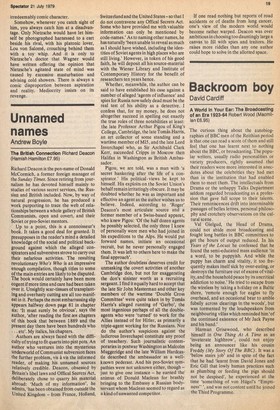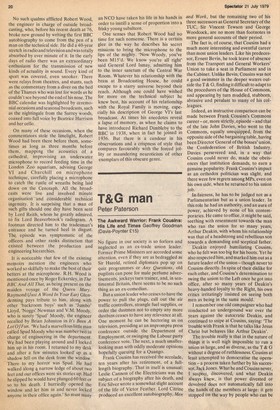Backroom boy
David Cardiff
A World in Your Ear: The Broadcasting of an Era 1923-64 Robert Wood (Macmillan £6.95) The curious thing about the autobiographies of BBC men of the Reithian period is that one can read a score of them and still feel that one has learnt next to nothing about the BBC, or broadcasting. The popular writers, usually radio personalities or variety producers, rightly assumed that their readers were more interested in anecdotes about the celebrities they had met than in the institution that had enabled them to meet them. The intellectuals from Drama or the unhappy Talks Department seldom regarded broadcasting as a profession that gave full scope to their talents. Their reminiscences drift into interminable passages of belles lettres, personal philosophy and crotchety observations on the cultural scene.
Val Gielgud, the Head of Drama, could not abide most broadcasting and fought long battles in BBC committees to get the hours of output reduced. In his Years of the Locust he confessed that he found the semi-educated mass audience 'in a word, to be puppyish. And while the puppy has charm and vitality, it too frequently makes itself sick by over-eating, or destroys the furniture out of excess of vitality, and the household peace by its uncritical addiction to noise.' He tried to escape from the wireless by taking a holiday on a Baltic shore, 'remote enough for eagles to fly overhead, and an occasional bear to amble fubsily across clearings in the Iwoods', but was tormented by the loudspeakers from neighbouring villas which reminded him of the continued existence of Mr Jack Payne and his band.'
Harman Grisewood, who described himself in One Thing At A Time as an 'inveterate highbrow', could not enjoy being an announcer like his cousin Freddy (My Story Of The BBC), It was a 'below stairs job' and in spite of the fact that he had 'learnt from David Jones and Eric Gill that lowly human practices such as plumbing or feeding the pigs should not be despised', he experienced at the time 'something of von Hiigel's "Emptiness" ', and was not content until he joined the Third Programme. No such qualms afflicted Robert Wood, the engineer in charge of outside broadcasting, who, before his recent death at 76, broke new ground by writing the first BBC autobiography to come from the pen of a man on the technical side. He did a 40-year stretch in radio and television andwas totally absorbed by ever minute of it. In the early days of radio there was an extraordinary enthusiasm for the transmission of new kinds of actuality in sound. Every kind of sport was covered, even snooker. There were relays from theatres, and stunts, such as the commentary from a diver on the bed of the Thames who was lost for words as he couldn't see beyond the end of his nose. The BBC calendar was highlighted by ceremonial occasions and seasonal broadcasts, such as the nightingale from the Surrey woods, coaxed into full voice by Beatrice Harrison and her cello.
On many of these occasions, when the commentators stole the limelight, Robert• Wood had been there before them, sometimes as long as three months before them, mapping the acoustics of a cathedral, improvising an underwater microphone to record feeding time in the London Zoo aquarium, advising George VI and Churchill on microphone technique, carefully placing a microphone to catch the rustle of wreaths being laid down on the Cenotaph. All the broadcasts were live and involved minute organisation—and considerable technical ingenuity. It is surprising that a man of such gifts should one day have been sent by Lord Reith, whom he greatly admired, to fix Lord Beaverbrook's radiogram. A footman directed him to the tradesman's entrance and he turned heel in disgust. Thee episode was symptomatic of the officersand other ranks distinction that existed between the production and engineering hierarchies.
It is noticeable that few of the existing memoirs mention the engineers who worked so skilfully to make the best of their betters at the microphone. R.H. Wood is mentioned once by Roger Eckersley, in The BBC And All That, as being present on the maiden voyage of the Queen Mary. Raymond (Just A Word In Your Ear,/ Glendenning pays tribute to him, along with other 'backroom boys' such as 'Jumbo' Lloyd, `Noggs' Newman and V.M. Moody, who is surely 'Spud' Moody, the engineer recalled by Brian Johnston in It's Been A Lot 0 f F'un. 'We had a marvellous little man called Spud Moody who was number two in charge of engineering in the department. We had been playing around and I locked him up in his room. I returned to my desk and after a few minutes looked' up as a shadow fell on the desk from the window. There to my horror was Spud. He had walked along a narrow ledge of about two feet and our offices were six stories up. Had he slipped he would have plunged 60 feet or so to his death. I hurriedly opened the window and let him in and never locked anyone in their office again.' So must many an NCO have taken his life in his hands in order to instill a sense of proportion into a frisky young subaltern.
One senses that Robert Wood had no time for such nonsense. There is a certain glee in the way he describes his secret missions to bring the microphone to the lips of the mighty. 'Now Woody, you've been M15'd. We know you're all right' said General Lord Ismay, admitting him to the inner sanctum of the Central War Room. Whatever his relationship with the brass at Broadcasting House, he could escape to a starry universe beyond their reach. Although one could have wished for more on the technical subject he knew best, his account of his relationship with the Royal Family is moving, especially his description of George VI's last broadcast. At times his anecdotes reveal .a lapse of memory, as when he claims to have introduced Richard Dimbleby to the BBC in 1938, when in fact he joined in 1936. But there is a candour in his observations and a crispness of style that compares favourably with the forced jollity or maundering neuroticism of other exemplars of this obscure genre.



































 Previous page
Previous page